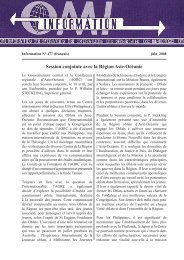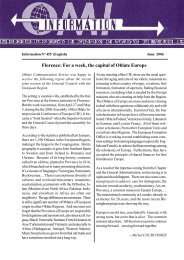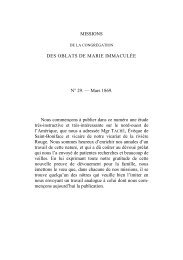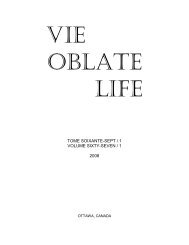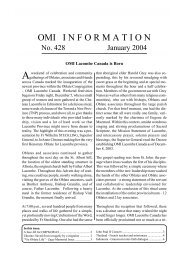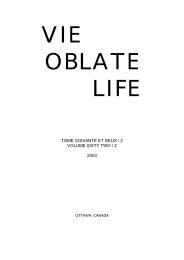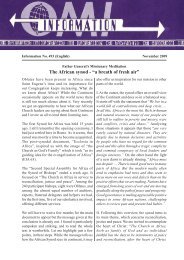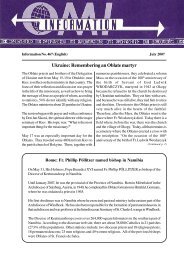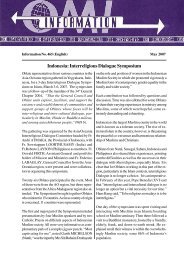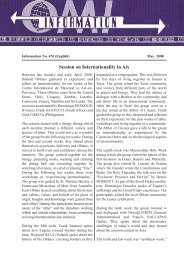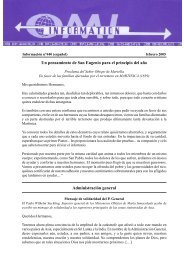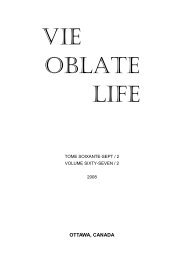Oct. 2005 - OMI World
Oct. 2005 - OMI World
Oct. 2005 - OMI World
You also want an ePaper? Increase the reach of your titles
YUMPU automatically turns print PDFs into web optimized ePapers that Google loves.
447/4 <strong>Oct</strong>ober <strong>2005</strong><br />
today. Christ offers grounding for life that<br />
will never be out of style like some passing<br />
fad: a grounding that will last. As the prophet<br />
Isaiah says, "Why do you spend your money for<br />
that which is not bread, and your labour for<br />
that which does not satisfy" To engage in today’s<br />
consumer society people need money.<br />
Christ’s message, on the other hand, is free, so<br />
that everyone, even the poor, can fully participate.<br />
Finally, Christ, and the message he<br />
brings, respects the dignity of all human life,<br />
whether weak or strong.<br />
As I walk to St. Michael's, our city-centre parish,<br />
I pass through the crowds of the Bullring.<br />
I often wrack my brains trying to find out<br />
how we, the Oblates ministering to secular<br />
culture, will reach these people. I am certain,<br />
however, that the message of Christ, the<br />
Risen One, is urgently needed in secular society<br />
and the many Bullrings of today.<br />
FRANCE-BENELUX<br />
Polish biography of Józef Cebula<br />
Five years ago, Fr. Józef PIELORZ wrote a<br />
biography of Blessed Józef Cebula that was<br />
published in French as volume six of the collection<br />
Oblate Writings II, and translated into<br />
English the following year. With the help of<br />
Fr. Jan CHMIST, he has now translated it<br />
into Polish. Fr. Alphonse KUPKA has provided<br />
illustrations.<br />
The author and now translator says that the<br />
Polish version differs a bit from the French. It<br />
has been corrected and completed by the discovery<br />
of new documents. Some passages,<br />
which were judged to be superfluous, have<br />
been removed. This Polish version, says Fr.<br />
Pielorz, is the one that is closest to the facts<br />
of history as we know them today.<br />
Africa-Madagascar<br />
MADAGASCAR<br />
25th anniversary of missionary presence<br />
This year of <strong>2005</strong> marks an important event<br />
in the life of the Missionary Oblates of Mary<br />
Immaculate in Madagascar. They are celebrating<br />
the 25 th Anniversary of their establishment<br />
in the Diocese of Tamatave.<br />
03 December 1980—03 December <strong>2005</strong><br />
Twenty-five years of presence among the<br />
poor. It has been a presence that is characterized<br />
by missionary involvement in all of the<br />
various aspects of life’s realities in a place<br />
where the first thing that strikes one is poverty.<br />
It is material poverty, although not destitution,<br />
yet a poverty that lets shine through a<br />
human wealth that bursts forth in a spirit of<br />
welcome, of sharing, and of availability.<br />
Another ever-present and dominating reality<br />
is ancestor worship. It is a practice that is<br />
very ceremonial, communitarian, and deeply<br />
anchored in the Malagasy soul. The life of<br />
the individual is always tied to different ancestral<br />
customs. Thus the question arises:<br />
how to preach the Good News of the Salvation<br />
wrought by Jesus Christ to a people who<br />
are so sure of having a permanent contact<br />
with the “beyond” simply by carrying out a<br />
certain number of very special rituals What<br />
is the future for these “primitive people” who<br />
are being confronted with globalisation,<br />
where technology, productivity, and instant<br />
success rule the day Is it already too late to<br />
prepare them for world-wide civilization that<br />
is already crushing them How can they<br />
avoid being railroaded by a progress that is<br />
perceived rather as “having more” than as<br />
“being better”<br />
The answers we bring are only drops of water<br />
that do not comprise an ocean, because in<br />
Madagascar, as in Africa, they evaporate before<br />
reaching any depth. There are realities<br />
that shout of social injustice, both in the rural<br />
areas and in the cities: very needy families;<br />
the elderly without any resources; young people<br />
who have no guidance; sick people who



